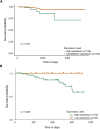Phosphoglycerate kinase 1 as a potential prognostic biomarker in papillary thyroid carcinoma
- PMID: 40771921
- PMCID: PMC12325314
- DOI: 10.3389/fphar.2025.1542159
Phosphoglycerate kinase 1 as a potential prognostic biomarker in papillary thyroid carcinoma
Abstract
Backgroud: Papillary thyroid carcinoma (PTC) represents a malignant epithelial tumor characterized with a preference for younger individuals. Despite its generally favorable prognosis, PTC still poses considerable challenges, particularly in regards to the propensity for distant metastasis. As a key enzyme in the glycolytic pathway, phosphoglycerate kinase 1 (PGK1) has been linked to the progression of various cancer types. However, its role in PTC remains to be elucidated. This study aimed to investigate the association between PGK1 expression in thyroid cancer tissues and clinicopathological features, postoperative recurrence, and prognosis to provide clinical assessment and intervention reference.
Methods: We investigated the correlation between PGK1 expression and the clinicopathological characteristics, recurrence, and prognosis in 97 PTC patients who underwent surgical treatments between 1 January 2020, and 31 December 2020 in Zhengzhou University First Affiliated Hospital. Besides, we also analysed the correlation of PGK1 expression with the 10-year survival rate of patients with thyroid carcinoma (THCA) in UALCAN database.
Results: PGK1 expression was higher in cancerous tissues than that in adjacent non-cancerous tissues. Further analysis of PGK1 expression across clinicopathological characteristics revealed that patients with poorly differentiated tumors, TNM stages III-IV, lymph node metastasis, and tumor diameter ≥1.0 cm exhibited higher PGK1 expression levels in cancerous tissues. A subsequent 3-year postoperative follow-up was conducted to evaluate the correlation between PGK1 expression and recurrence. During this period, 31.96% of patients experienced recurrence, with higher PGK1 expression correlating with increased recurrence rates. Moreover, patients with higher PGK1 expression in cancerous tissue exhibited a significantly lower survival rate of 79.20% compared to the PGK1-low/medium group. Lastly, age, lymph node metastasis, differentiation degree, TNM stage, and tumor diameter were identified as risk factors for poor prognosis in patients with PTC analyzed by Cox regression.
Conclusion: Our study demonstrated that PGK1 expression may serve as a potential prognostic biomarker of PTC.
Keywords: clinicopathological characteristics; papillary thyroid carcinoma (PTC); phosphoglycerate kinase 1 (PGK1); prognosis; recurrence.
Copyright © 2025 Shi, Liu, Liu, Geng, Zhang, Wang, Chen, Zhao, Jue, Qin and Liu.
Conflict of interest statement
The authors declare that the research was conducted in the absence of any commercial or financial relationships that could be construed as a potential conflict of interest.
Figures



Similar articles
-
Expression of WNT10A in papillary thyroid carcinoma and its effect on cell proliferation, invasion, and metastasis.Zhong Nan Da Xue Xue Bao Yi Xue Ban. 2025 Mar 28;50(3):402-415. doi: 10.11817/j.issn.1672-7347.2025.240237. Zhong Nan Da Xue Xue Bao Yi Xue Ban. 2025. PMID: 40628509 Chinese, English.
-
BRAF mutation in papillary thyroid cancer and its value in tailoring initial treatment: a systematic review and meta-analysis.Medicine (Baltimore). 2012 Sep;91(5):274-286. doi: 10.1097/MD.0b013e31826a9c71. Medicine (Baltimore). 2012. PMID: 22932786
-
Clinical value of SPP1 overexpression in patients with papillary thyroid carcinoma.Transl Cancer Res. 2025 Jul 30;14(7):4100-4114. doi: 10.21037/tcr-2024-2568. Epub 2025 Jul 14. Transl Cancer Res. 2025. PMID: 40792167 Free PMC article.
-
Predicting the Unexpected: Clinicopathological Insights into Skip Metastasis in Papillary Thyroid Carcinoma.J Clin Med. 2025 Jun 15;14(12):4255. doi: 10.3390/jcm14124255. J Clin Med. 2025. PMID: 40566000 Free PMC article.
-
Impact of residual disease as a prognostic factor for survival in women with advanced epithelial ovarian cancer after primary surgery.Cochrane Database Syst Rev. 2022 Sep 26;9(9):CD015048. doi: 10.1002/14651858.CD015048.pub2. Cochrane Database Syst Rev. 2022. PMID: 36161421 Free PMC article.
References
LinkOut - more resources
Full Text Sources
Research Materials
Miscellaneous

